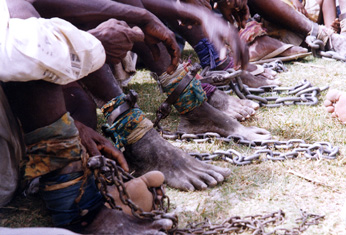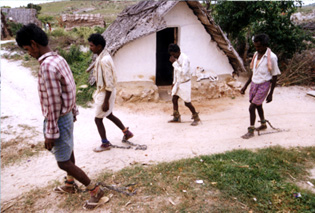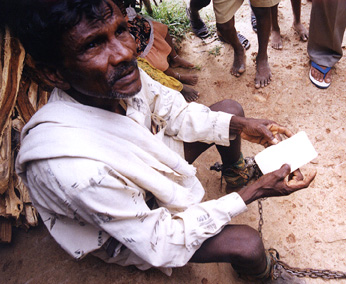Life in Chains
Bonded Labour: Tortured and terrorised,
five men suffered in fetters in a stone quarry for two years
Soorya Prakash
 Venkatesh, a 58-year-old Dalit, has
not come to terms with freedom. The 15-kg
iron chain that clung to his ankles for two years is gone and
his lean frame has suddenly become unbearably light. "It
is a strange feeling. It is like coming out of water,"
he laughs, showing his tobacco-stained teeth. His walk is
measured and cautious; curiously similar to an infant taking
its first steps.
Venkatesh, a 58-year-old Dalit, has
not come to terms with freedom. The 15-kg
iron chain that clung to his ankles for two years is gone and
his lean frame has suddenly become unbearably light. "It
is a strange feeling. It is like coming out of water,"
he laughs, showing his tobacco-stained teeth. His walk is
measured and cautious; curiously similar to an infant taking
its first steps.
Ever since he can remember, Venkatesh has been crushing
stones for a living. His father came to Mysore from the
semi-arid Rayalaseema region of Andhra Pradesh as part of the
labour force that built the Krishnaraja Sagar dam. The family
settled there and worked in stone quarries in and around
Mandya.
Of human bondage: The
five men in chains after the rescue (below left).
Venkatachala holds his grandson after he was released from
the quarry
Four years ago, Venkatesh began working in a stone quarry at
Arakere near Srirangapatnam, the capital of Tipu Sultan, who
resisted the British enslavement of India. From dawn to dusk,
he crushed half a tractor-load of jelly stones for Rs 55.
One day he asked his employer for a loan. Puttaswamy Gowda,
the driver-turned-quarry owner, who was once a Janata Dal
corporator in Mysore, readily lent him Rs 4,250. Two years
later Venkatesh told the quarry's foreman Muniyappa that he
had repaid the loan with interest and that he wanted to move
to another quarry as the pay was too low at Gowda's quarry.
 Gowda's goons thrashed him the following day,
saying he still owed money to Gowda. "I had repaid more
than Rs 10,500. But he said I still owed him more than Rs
7,000," says Venkatesh. They took him in a jeep to a
welder in Mysore city 15 km away and chained his legs. The
nuts and bolts in the fetters were welded so that he would
not be able to remove them. "They chained me not for the
money, but because I wanted to leave," says Venkatesh.
Gowda's goons thrashed him the following day,
saying he still owed money to Gowda. "I had repaid more
than Rs 10,500. But he said I still owed him more than Rs
7,000," says Venkatesh. They took him in a jeep to a
welder in Mysore city 15 km away and chained his legs. The
nuts and bolts in the fetters were welded so that he would
not be able to remove them. "They chained me not for the
money, but because I wanted to leave," says Venkatesh.
After Venkatesh, four other Dalits were chained—Venkatesh's
son Gopal, Venkatachala, Nagaraju and Krishna. They also had
owed Gowda sums ranging from Rs 500 to Rs 1,000 and the
amounts somehow multiplied in the account books—500 became
5000 simply by adding a zero. "Even the cost of the
chain, welding and transport was added to our loans,"
says Nagaraju, who is from Krishnaraja Sagar.
The chained men were kept in a shack away from their
families. "My son Gopal has not slept with his wife for
two years. How can we explain our pain to others,"
Venkatesh says with tears in his eyes.
The children were also made to work. Many of them were sent
to a nearby cement factory. "When our children are here,
how can we run away? The owner (that's what the workers call
Gowda) knew that," says Gopal's wife, Lakshmi.
 Krishna,
Nagaraju, Venkatesh and Venkatachala walk to freedom soon
after the Sangha activists barged into the worker's camp at
the quarry at Arakere near Srirangapatnam.
Krishna,
Nagaraju, Venkatesh and Venkatachala walk to freedom soon
after the Sangha activists barged into the worker's camp at
the quarry at Arakere near Srirangapatnam.
Whenever a labourer ran away from the quarry, the owner gave
the foreman money to find the fugitive. "Their goons
would wait at liquor shops in the evening and collect
information. When they found the man, they would bundle him
into a jeep and take him back to the quarry," says
Devraj, a quarry worker. "They want us to work and die
here."
Krishna was beaten black and blue a week before he got
freedom. The offence: he took out one of his dear
possessions—a pair of trousers—and wrapped it around his
waist. "We could not wear even knickers or underwear
because of the chain. I just wrapped the pants to cover
myself because I was washing the lungi," says Krishna.
Muniyappa, the foreman, saw it and reported. The goons
suspended Krishna from a tree and beat him till his toenail
broke and blood oozed out.
Mercifully, his wife and children were not around to see the
torture and humiliation. He had sent them away to his
mother's house near Mysore, a week after he had started
working for Gowda.
Ask any woman about life in the quarry, hushed tones and
silence prevail. Krishna's relatives Rajamma and Ankamma,
however, admit that women were put to unspeakable
difficulties.
Recently, there was a death in the quarry: a woman called
Kamalamma died in a fire. It was apparently a case of
self-immolation. Even her family does not want to talk about
the death, but there are stories of molestation and rape in
the quarry.
The 23 families (25 men, 30 women and 30 children) at the
quarry lived in a perpetual shadow of fear. Even the women
and children were beaten up if they spoke against the quarry
owner. The goons broke Venkatesh's wife Venkatalakshmamma's
hand for abusing one of them.
The goons followed the women whenever they went to buy food,
making sure that they did not talk to anyone. The labourers
were not even allowed to talk to the lorry drivers who came
to collect the jelly stones.
 Venkatesh
shows the book in which Gowda wrote accounts. He repaid more
than Rs 10,500 for the Rs 4,250 he had borrowed but was told
he still owed more than Rs 7,000.
Venkatesh
shows the book in which Gowda wrote accounts. He repaid more
than Rs 10,500 for the Rs 4,250 he had borrowed but was told
he still owed more than Rs 7,000.
It was, therefore, a minor miracle that
activists of the Karnataka Rajya Raitha Sangha could discover
the chained men in the quarry during a civic election
campaign in June. One Sangha activist, Lokesh, barged into a
hut in the quarry to distribute pamphlets, despite resistance
from the goons, and found Venkatesh in chains. Venkatesh told
Lokesh that he was from Kadathanala village near Pandavapura
in Mandya district. "I asked him to tell Nanjunde Gowda
about my condition," Venkatesh says. Nanjunde Gowda, a
Sangha leader, is popular in these parts.
Alerted on the eve of elections, Nanjunde Gowda planned a
rescue operation with the help of lawyer K.R. Keshava Murthy,
a former Sangha activist. In a dramatic move, 60 Sangha
activists accompanied by journalists broke through the main
gate of the quarry during lunch hour on June 21. They rescued
four shackled men from a hut and Gopal from his work site.
During the rescue operation, Gowda's son Arun Kumar
threatened to blast the activists with dynamite. A minor
skirmish ensued, and the goons manhandled Nethra Raju, who
was video-graphing the event. "We knew that the local
police were hand in glove with the quarry owner. He used to
bribe them and we could not trust them. So, we called Deputy
Superintendent G. Nagappa of Srirangapatnam," says
Nanjunde Gowda.
Nagappa's response was far from encouraging, says lawyer
Murthy. ["I am not prepared to say anything,"
Nagappa told The Week. "All details will be given in the
court."] Even as the police looked on, Arun Kumar called
his uncles on his mobile phone asking them to move the
remaining labourers and their families to another location.
The Sangha activists quickly thwarted the attempt.
It was only in the evening, when the activists informed
Minister M. Shivanna about the chaining, that the magnitude
of the matter dawned on the police. By then, Sangha activists
had started a dharna before the Srirangapatnam police station
for the arrest of Puttaswamy Gowda, who had vanished. They
were also angry that the police had removed the chains before
the five men could be produced before a magistrate.
Nanjunde Gowda believes that the police certainly knew about
the existence of bonded labour in Arakere. "When
Kamalamma committed suicide last week, the police went there
to make an inquest. They must have certainly seen the chained
men," he says. Minister of State for Social Welfare
Baburao Chavan feels that the police may not have been aware
of it. "The chained men were locked up in a room when
the police went there," he says. Chavan, however, admits
the failure of labour and revenue officials to report the
plight of the workers.
Even though Mandya is Chief Minister S.M. Krishna's
constituency, he did not visit the victims. The man he
deputed, Home Minister Mallikarjuna Kharge, did not go to the
Nimishamba Temple where they were temporarily put up.
Instead, he asked the five chained men to meet him at the
inspection bungalow. "Being a Dalit himself, he should
have shown some concern," says a Sangha activist.
Two days after the labourers were freed from their chained
existence, their former 'owner' was sighted again in Mandya:
as Puttaswamy Gowda surrendered before the district court,
there was a glint of hope that the metal that he had used so
cruelly would finally clamp around his wrists.